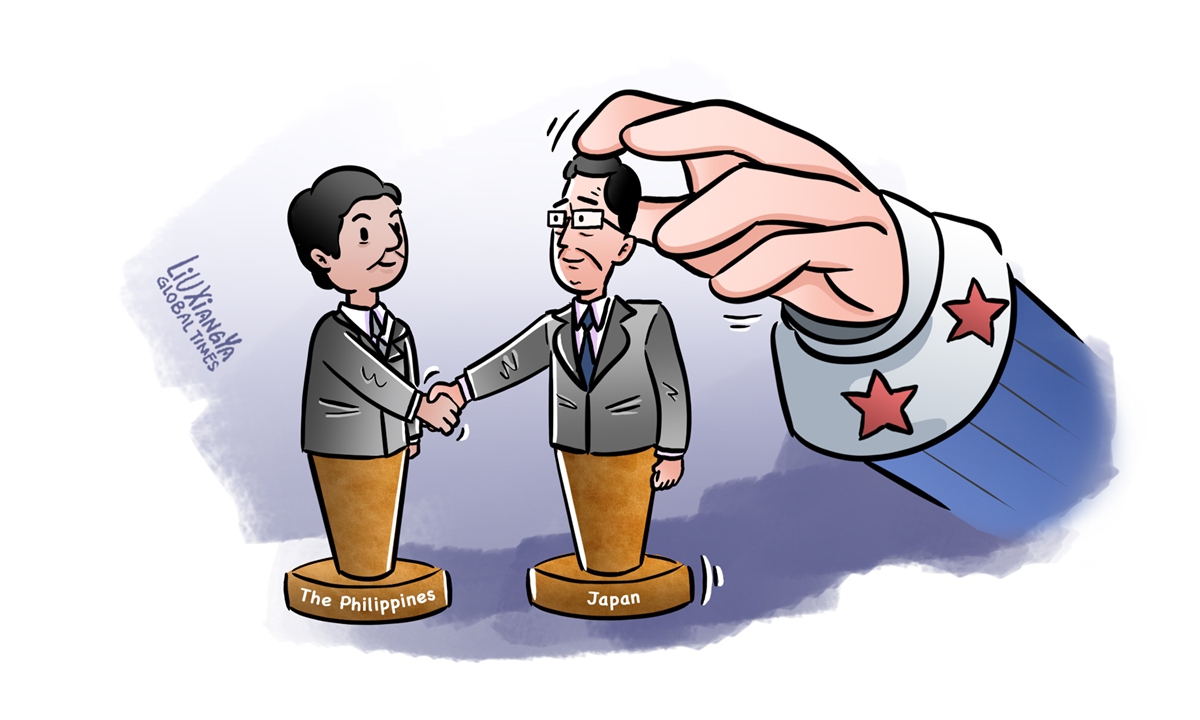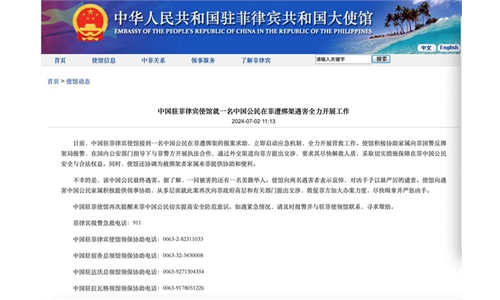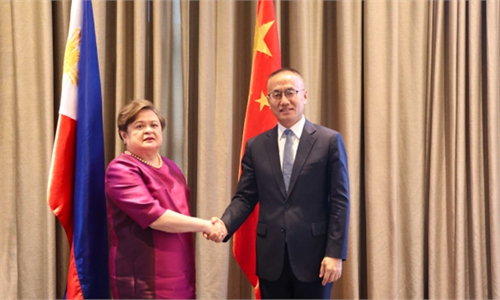Deepening ties toward a quasi-alliance with Tokyo puts Manila on a dangerous path

Illustration: Liu Xiangya/GT
According to the Asahi Shimbun, Japan and the Philippines will hold a "2+2" foreign and defense ministerial meeting in Manila on July 8 to strengthen strategic relations and discuss regional issues. The report also revealed that Japan and the Philippines will sign a Reciprocal Access Agreement (RAA), allowing their respective militaries to visit each other's soil. Japan's deepening defense cooperation with the Philippines is not simply focused on bilateral relations but rather on engaging more deeply in the South China Sea affairs in the future.
The meeting is the second "2+2" meeting between Japan and the Philippines since April 2022. As early as May of this year, the Japanese side had announced in advance that a "2+2" meeting would be held with the Philippines in July. This announcement was made not long after the first trilateral US-Japan-Philippines leaders' summit. Given the Philippines' continuous provocations over China in the South China Sea, the Japanese side's early announcement was not solely to promote the second Japan-Philippines "2+2" meeting but to demonstrate Japan's firm "support" for the Philippines and to encourage the country to continue confronting China on the South China Sea issue.
The special focus of Japan and the Philippines to hold a "2+2" meeting is signing the RAA, which will significantly advance the Japan-Philippines relationship toward a quasi-alliance direction. In November of last year, during Japanese Prime Minister Fumio Kishida's visit to the Philippines, the two sides started negotiations on the RAA. Since then, Japan-Philippines defense cooperation has accelerated. If Japan and the Philippines officially sign the RAA, it will not only allow for more larger-scale joint military exercises in the future, but also pave the way for additional agreements or documents that will deepen bilateral defense cooperation. This will ultimately strengthen and solidify the quasi-alliance relationship between the two countries.
The signing of the RAA will facilitate Japan and the Philippines to jointly further escalate tensions in the South China Sea. The Philippines will be the third country to sign the RAA with Japan, following Australia and the UK. For Japan, which actively cooperates with the US to implement the "free and open Indo-Pacific" strategy, deepening relations with the Philippines not only helps contain China in the so-called first and second island chains, but also facilitates deeper involvement in and disruption of South China Sea affairs in the future.
In fact, the strengthening of defense cooperation between Japan and the Philippines, and even the trilateral interaction between the US, Japan and the Philippines, will only exacerbate the current tense situation in the South China Sea and undermine China's efforts to cool the situation down.
Just before the Japan-Philippines "2+2" meeting, the vice foreign ministers of China and the Philippines jointly chaired the ninth meeting of the China-Philippines Bilateral Consultation Mechanism on the South China Sea in Manila on Tuesday. The two sides had a candid and constructive exchange of views on the situation in the South China Sea, in particular, on how to handle the situation at Ren'ai Jiao.
The Philippines' sincerity is already in doubt since it keeps stirring up the waters in the sea by confronting the Chinese side. After the infringement activities related to Huangyan Dao and Ren'ai Jiao, the Philippines has attempted to assert its presence at China's Xianbin Jiao.
Now being wooed by the US and Japan, it's anticipated that the Philippines would continue its dangerous provocations. However, the Philippines should bear in mind: Those countries just intend to use the Philippines as a pawn against China, stirring up regional tensions and even forcing regional countries to take sides through the escalation of incidents.
The second "2+2" meeting between Japan and the Philippines might be another "highlight moment" for the Philippines, following the leaders' meeting between the US, Japan and the Philippines in April this year. However, the Philippines should also think carefully and cautiously about what it will bring after deepening ties with Japan, which has been increasingly active in the military field in recent years and is continuously breaking through the peace constitution.
The author is a visiting researcher at the Institute of Japan Studies, Liaoning University. opinion@globaltimes.com.cn



